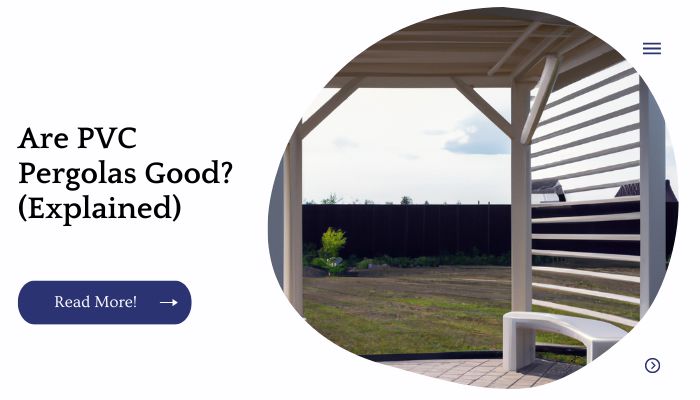If you’re looking for a pergola that won’t rot or splinter, but still want the look of wood, then PVC is a good choice. It’s durable, lightweight and easy to install.
Plus, you can find it at any home improvement store and it doesn’t cost very much money. So are PVC pergolas good? Yes!
| Takeaways |
|---|
| PVC pergolas offer durability and longevity. |
| They are resistant to rot, pests, and decay. |
| PVC material requires minimal maintenance. |
| PVC pergolas are customizable and versatile. |
| They can withstand harsh weather conditions. |
Are Pvc Pergolas Good?
Pergolas are a great way to add shade and shelter to your outdoor space, but they can be used for a variety of purposes.
Some people use them as an outdoor kitchen, others use them as entertainment areas or sitting rooms. You can even use pergola kits if you want to build a custom structure with multiple arches and columns.
Pergolas have been used since ancient times, though most historical examples were built from wood rather than PVC (polyvinyl chloride).
As long as you know how to choose the right materials for your project (and what not to do), there’s no reason why your PVC pergola won’t last just as long as its predecessors did!
When it comes to PVC pergolas, one important factor to consider is their waterproofing capabilities. If you want to know more about the waterproofing aspect, check out our detailed guide on are solar pergolas waterproof.
1. Pvc Pergolas Are Environmentally Friendly
PVC is made from recycled plastic. This means that PVC pergolas are 100% recyclable, which makes them environmentally friendly. In addition, PVC doesn’t absorb water or emit harmful fumes like other types of plastics do. Because it’s not toxic, PVC is safe for the environment, too!
2. Pvc Is Recyclable
PVC is a very recyclable material. When you throw PVC away, it will be broken down into small molecules and then converted into new products.
To recycle your old PVC pergola and make sure it goes to the right place, take it to your local recycling center!
| Aspect | PVC Benefits |
|---|---|
| Recyclable | Can be recycled and reused |
| Sustainability | Contributes to environmental preservation |
| Reduced waste | Minimizes landfill accumulation |
| Energy efficiency | Requires less energy for recycling |
| Resource conservation | Reduces reliance on raw materials |
3. Pvc Is Safe And Non-Toxic
The chemical makeup of PVC makes it non-toxic, and therefore safe for use in the construction of pergolas. PVC is a product of the petrochemical industry, which means that it’s derived from petroleum.
The process by which this material is made has been refined over time to create a durable and reliable building material that can be used safely in many different applications.
PVC has been used in consumer products for decades with no significant concerns about toxicity or other health hazards associated with its usage.
In fact, it’s even used as an ingredient in some medications if you happen to be one of those people who are allergic to latex but still need an injection every so often!
The natural aspect of PVC makes it ideal for creating a healthy living space where plants can thrive without being subjected to harmful pollutants like pesticides or fertilizers and since these materials aren’t needed for maintenance either there’s less risk involved when using them around children or pets (as long as there aren’t any sharp edges).
Safety is a paramount concern when choosing a pergola for your outdoor space. We have compiled 12 important facts to help you understand the safety aspects of pergolas. Explore our comprehensive guide on are pergolas safe and make an informed decision.
4. Pvc Doesn’t Absorb Water
PVC is a type of plastic that is impervious to water. This means it will not absorb water, so it won’t rot or mildew. It also resists mold and mildew, making PVC a great choice for outdoor pergolas in humid climates.
PVC stands for polyvinyl chloride, and it’s one of many types of plastics used in building materials and other household items like furniture. The most common use for PVC is pipe insulation.
5. Pvc Is Textured So It Feels And Looks Like Real Wood
Another great benefit of PVC pergolas is that they look and feel like real wood. This means you don’t have to sacrifice your aesthetic preferences for a lower-cost option.
Using UV-resistant materials, these pergolas are also durable and low-maintenance allowing you to spend more time relaxing under your structure than maintaining it!
| Aspect | PVC Benefits |
|---|---|
| Look | Mimics the appearance of real wood |
| Texture | Textured surface for a natural wood-like feel |
| Grain | Detailed grain patterns for authenticity |
| Color | Various color options resembling wood species |
| Maintenance | No need for staining, sealing, or painting |
6. Pergolas Made Of Pvc Are Low Maintenance
If you’re interested in installing a pergola from PVC, then you’ll be pleased to know that these types of materials are generally very low maintenance.
They can be cleaned with a hose, power washer or pressure washer. Even though some people use bleach on their pergolas, it is not necessary to do so unless you want to remove stains or mold from them.
You can also use garden hoses instead of chemicals if you don’t want your lawn to get damaged by harsh chemicals.
If you’re part of an HOA and considering adding a pergola to your property, it’s crucial to understand the regulations and guidelines. Our informative article on are pergolas allowed in HOA explains the rules and provides valuable insights for a hassle-free installation.
7. Pvc Is Colorfast And Stands Up To Uv Rays
PVC is colorfast and stands up to UV rays, which means the color won’t fade over time. When you invest in a pergola made of PVC, you get the peace of mind that comes with knowing your beautiful shade structure will remain attractive for years to come.
Having said that, a PVC pergola will eventually need some maintenance work. As it ages and gets dirty from use, dirt can accumulate on its surface.
Fortunately, cleaning PVC is relatively simple: All you have to do is spray it down with water and use a soft brush or sponge to remove any stubborn dirt before wiping it down with an antibacterial solution (this helps prevent mold growth).
8. Pvc Pergolas Withstand Harsh Weather Conditions
PVC pergolas are made of a sturdy material that can withstand harsh weather conditions. This is especially helpful if you live in an area that gets a lot of rain or snow, as PVC is highly durable and won’t crack like wood can.
It is also lightweight which makes it easy to move around if needed and install yourself without any help from professionals.
| Weather Conditions | Performance of PVC Pergolas |
|---|---|
| High winds | Resistant and sturdy |
| Heavy rain | Waterproof and long-lasting |
| Intense sunlight | UV-resistant and fade-resistant |
| Snow and ice | Strong and able to bear the weight |
| Extreme temperatures | Withstand hot and cold climates |
9. You Can Paint Your Pergola Any Color You Like
You can paint your pergola any color you like to coordinate with your décor or outdoor furniture. If you’re worried about painting, consider a stain instead.
This will protect against weathering and add a bit of character to your structure without having to worry about it fading over time.
Ensuring the stability of outdoor structures like pergolas is essential for their longevity. If you’re looking for tips on anchoring a pergola on a rocky surface, our guide on how to anchor a tent on rock offers valuable techniques and advice.
10. You Can Install A Pergola Made Of Pvc Yourself Because It’s Lightweight
As a DIY project, you can install a PVC pergola yourself because it’s lightweight and relatively easy to work with.
You’ll only need a few tools, such as a hammer, screwdriver, and saw. You can find detailed installation instructions on the internet if you do not have the skills or experience necessary to complete this type of project on your own (or are looking for an extra set of hands).
If you feel confident in your ability to install these types of structures yourself then there is no reason why it should take longer than 1 day or 2 days at most if you are installing several pergolas in one location at once.
Have you ever wondered if it’s possible to use a plastic roof on your pergola? Our article on can you put a plastic roof on pergola explores the feasibility and benefits of using a plastic roof, providing you with important insights for your pergola project.
Conclusion
PVC pergolas are an excellent choice for your home’s outdoor living space. They offer all the benefits of wood, but with some added advantages.
They’re lightweight and easy to install, so you can have a beautiful pergola in no time at all! Not only that, but PVC is environmentally friendly because it doesn’t require painting or staining like traditional wood does.
It also won’t absorb water like wood does when it rains heavily (which means no more moldy smells).
Further Reading
Here are some additional resources for further reading on the topic of pergolas:
Pergolas 101: Everything You Need to Know Before Buying a Pergola
This comprehensive guide provides an in-depth overview of pergolas, covering everything from design considerations to installation tips.
Choosing the Best Pergola Material for Your Outdoor Space
Learn about the different materials used in pergola construction and discover which one might be the best fit for your specific needs.
Advantages of PVC Arbors and Pergolas
Explore the benefits of using PVC (polyvinyl chloride) for arbors and pergolas, including durability, low maintenance, and design versatility.
FAQs
Here are some frequently asked questions about pergolas:
How do I choose the right size for my pergola?
The size of your pergola depends on various factors, such as the available space, intended use, and aesthetic preferences. Consider the dimensions of your outdoor area and how you plan to use the pergola to determine an appropriate size.
Can I install a pergola myself, or do I need professional assistance?
While it is possible to install a pergola yourself, it can be a complex project. Factors such as the design, materials, and site preparation may require expertise. It’s recommended to consult installation guides or consider hiring professionals for a successful installation.
What maintenance is required for a pergola?
The maintenance requirements for a pergola depend on the materials used. Wood pergolas may require regular staining or sealing, while PVC or metal pergolas generally require less maintenance. Regular cleaning and inspections for any signs of damage are also recommended.
Can I attach a pergola to my existing structure, such as a house or deck?
Yes, it is possible to attach a pergola to an existing structure. However, proper planning, structural considerations, and possibly professional advice are necessary to ensure a secure and safe attachment.
Are permits required to build a pergola?
The need for permits to build a pergola varies based on local building codes and regulations. It’s important to check with your local municipality or building department to determine if permits are required for your specific pergola project.

I am Hellen James, a professional handywoman with expertise in improving home and garden spaces by using pergolas, gazebos, and tents.


